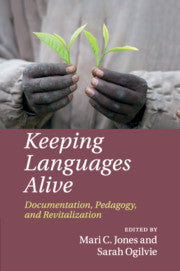Keeping Languages Alive : Documentation, Pedagogy and Revitalization
- Unit price
- / per
-
Author:JONES Mari / OGILVIE Sarah
-
ISBN:9781108790406
-
Publication Date:December 2019
-
Edition:1
-
Pages:283
-
Binding:Paperback
-
Publisher:Cambridge University Press
-
Country of Publication:United Kingdom


A Back Order button means that we don’t have the book in stock at our store. It may already be on order – or we can order it for you from a publisher or distributor at no additional cost.
As we source items from around the globe, a back-order can take anywhere from 5 days to several weeks to arrive, depending on the title.
To check how long this might take, you’re welcome to contact us and we can provide an ETA or any other information you need. We recommend checking the timeframe before committing to an online order.
Keeping Languages Alive : Documentation, Pedagogy and Revitalization
- Unit price
- / per
-
Author:JONES Mari / OGILVIE Sarah
-
ISBN:9781108790406
-
Publication Date:December 2019
-
Edition:1
-
Pages:283
-
Binding:Paperback
-
Publisher:Cambridge University Press
-
Country of Publication:United Kingdom
Description
New Zealand content: Chapter 9. New technologies and pedagogy in language revitalisation: the case of Te Reo Maori in Aotearoa/New Zealand Tania Ka'ai, John Moorfield and Muiris Ó Laoire
Many of the world's languages have diminishing numbers of speakers and are in danger of falling silent. Around the globe, a large body of linguists are collaborating with members of indigenous communities to keep these languages alive. Mindful that their work will be used by future speech communities to learn, teach and revitalise their languages, scholars face new challenges in the way they gather materials and in the way they present their findings. This volume discusses current efforts to record, collect and archive endangered languages in traditional and new media that will support future language learners and speakers. Chapters are written by academics working in the field of language endangerment and also by indigenous people working 'at the coalface' of language support and maintenance. Keeping Languages Alive is a must-read for researchers in language documentation, language typology and linguistic anthropology.
Adding product to your cart
You may also like
A Back Order button means that we don’t have the book in stock at our store. It may already be on order – or we can order it for you from a publisher or distributor at no additional cost.
As we source items from around the globe, a back-order can take anywhere from 5 days to several weeks to arrive, depending on the title.
To check how long this might take, you’re welcome to contact us and we can provide an ETA or any other information you need. We recommend checking the timeframe before committing to an online order.
You may also like
You may also like
-
New Zealand content: Chapter 9. New technologies and pedagogy in language revitalisation: the case of Te Reo Maori in Aotearoa/New Zealand Tania Ka'ai, John Moorfield and Muiris Ó Laoire
Many of the world's languages have diminishing numbers of speakers and are in danger of falling silent. Around the globe, a large body of linguists are collaborating with members of indigenous communities to keep these languages alive. Mindful that their work will be used by future speech communities to learn, teach and revitalise their languages, scholars face new challenges in the way they gather materials and in the way they present their findings. This volume discusses current efforts to record, collect and archive endangered languages in traditional and new media that will support future language learners and speakers. Chapters are written by academics working in the field of language endangerment and also by indigenous people working 'at the coalface' of language support and maintenance. Keeping Languages Alive is a must-read for researchers in language documentation, language typology and linguistic anthropology.
-
-
Author: JONES Mari / OGILVIE SarahISBN: 9781108790406Publication Date: December 2019Edition: 1Pages: 283Binding: PaperbackPublisher: Cambridge University PressCountry of Publication: United Kingdom
New Zealand content: Chapter 9. New technologies and pedagogy in language revitalisation: the case of Te Reo Maori in Aotearoa/New Zealand Tania Ka'ai, John Moorfield and Muiris Ó Laoire
Many of the world's languages have diminishing numbers of speakers and are in danger of falling silent. Around the globe, a large body of linguists are collaborating with members of indigenous communities to keep these languages alive. Mindful that their work will be used by future speech communities to learn, teach and revitalise their languages, scholars face new challenges in the way they gather materials and in the way they present their findings. This volume discusses current efforts to record, collect and archive endangered languages in traditional and new media that will support future language learners and speakers. Chapters are written by academics working in the field of language endangerment and also by indigenous people working 'at the coalface' of language support and maintenance. Keeping Languages Alive is a must-read for researchers in language documentation, language typology and linguistic anthropology.
-
Author: JONES Mari / OGILVIE SarahISBN: 9781108790406Publication Date: December 2019Edition: 1Pages: 283Binding: PaperbackPublisher: Cambridge University PressCountry of Publication: United Kingdom
-



